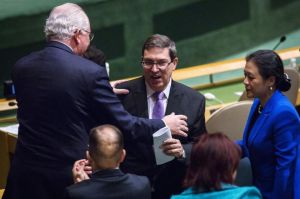
This article was first published on the ANSWER Coalition website, www.ANSWERcoalition.org
In a smashing victory this morning, 191 countries in the UN General Assembly voted against the U.S. blockade of Cuba, in the highest vote since the annual UN resolution was first presented in 1992. Last year’s vote was 188 opposing the blockade, two in favor, and three small Pacific nations, Marshall Islands, Federated States of Micronesia and Palau, had abstained.
Today, only two countries, the United States and Israel, backed the 55-year policy that has caused so much damage to the Cuban people and economy. There were no abstentions.
Last Dec. 17, President Obama announced that diplomatic relations would be re-established and that the U.S. blockade should end. The remaining three of the Cuban Five heroes were also freed from U.S. prison.
But Cuba’s foreign minister, Bruno Rodríguez Parrilla, made clear today before the General Assembly session that nothing substantial has changed with respect to the blockade.
He said, “Ten months after the announcements of December 17, there has been not one tangible or substantial modification in the blockade.
“The elimination of Cuba from the spurious list of State sponsors of international terrorism was the inevitable rectification of an absurdity, but it has barely had any effect on the implementation of the blockade, which is sustained by sanctions and previous laws that are far more encompassing.”
The blockade is not only a ban on U.S. trade with the island nation but also, as Rodríguez pointed out, a weapon designed to break other countries’ economic relations with Cuba:
“Barely one week ago, a fine of $1.116 billion was imposed on the French bank Credit Agricole, added to the fine of $1.710 billion on the German Commerzbank last March, for transactions with Cuba and other States.”
In agriculture, industry and medical fields, the blockade remains as deadly as ever.
Rodríguez continued: “Numerous examples could be mentioned, such as the Elekta company that confirmed last September 2 it could not supply the radioactive isotope Iridio-192 to the National Institute of Oncology and Radiobiology, nor to other hospitals. It guarantees the normal functioning of the equipment for bracheotherapy, it is essential for providing treatments of greater quality and precision against cancer. But its supplier, the U.S. company Mallinckrodt Pharmaceuticals refused to sell it to Cuba.”
The sole purpose and reasoning of the U.S. blockade—enforced by every U.S. administration beginning with that of John F. Kennedy—was to create so much suffering in the Cuban population that the people would surrender and presumably, overthrow the government.
There is only one problem with this “reasoning.” The Cuban Revolution is made of, by and for the Cuban people. They gained too much freedom in 1959 to see it stolen again, as it was when U.S. imperialism invaded in 1898 and imposed its complete domain on the island for decades.
The revolutionary victory of January 1, 1959, was the beginning of Cuba’s real independence and hope for true development.
But almost immediately, the brutal vengeance of Washington struck at Cuba and soon became a monstrous policy of laws, regulations and policies known collectively as the U.S. blockade.
Each decisive blow that loosened the grip of U.S. capital—the nationalization of banks, land and industry—brought counter-blows by Washington.
On April 16, 1961, the eve of the U.S. proxy Bay of Pigs invasion, when bombs were already dropping, Cuban leader Fidel Castro declared the socialist character of the Revolution:
“What the imperialists can’t forgive is the dignity, the courage, the ideological firmness, the spirit of sacrifice and the revolutionary spirit of the Cuban people. What they can’t forgive is that we are right under their noses, and that we have made a Socialist Revolution right under the nose of the United States!”
Cuba has paid a heavy price for revolution. In addition to more than $1.2 trillion dollars in damages caused by the economic, financial and commercial blockade, 3,478 Cubans died from U.S.-sponsored terrorism, 2,099 wounded.
But Cuba’s heroic resistance has prevailed and its example is hailed the world over. Today’s vote, although with no concrete application in the UN, further exposes U.S. policy as criminal and strengthens the world’s support for Cuba.
Congratulations Cuba! The blockade must fall!





